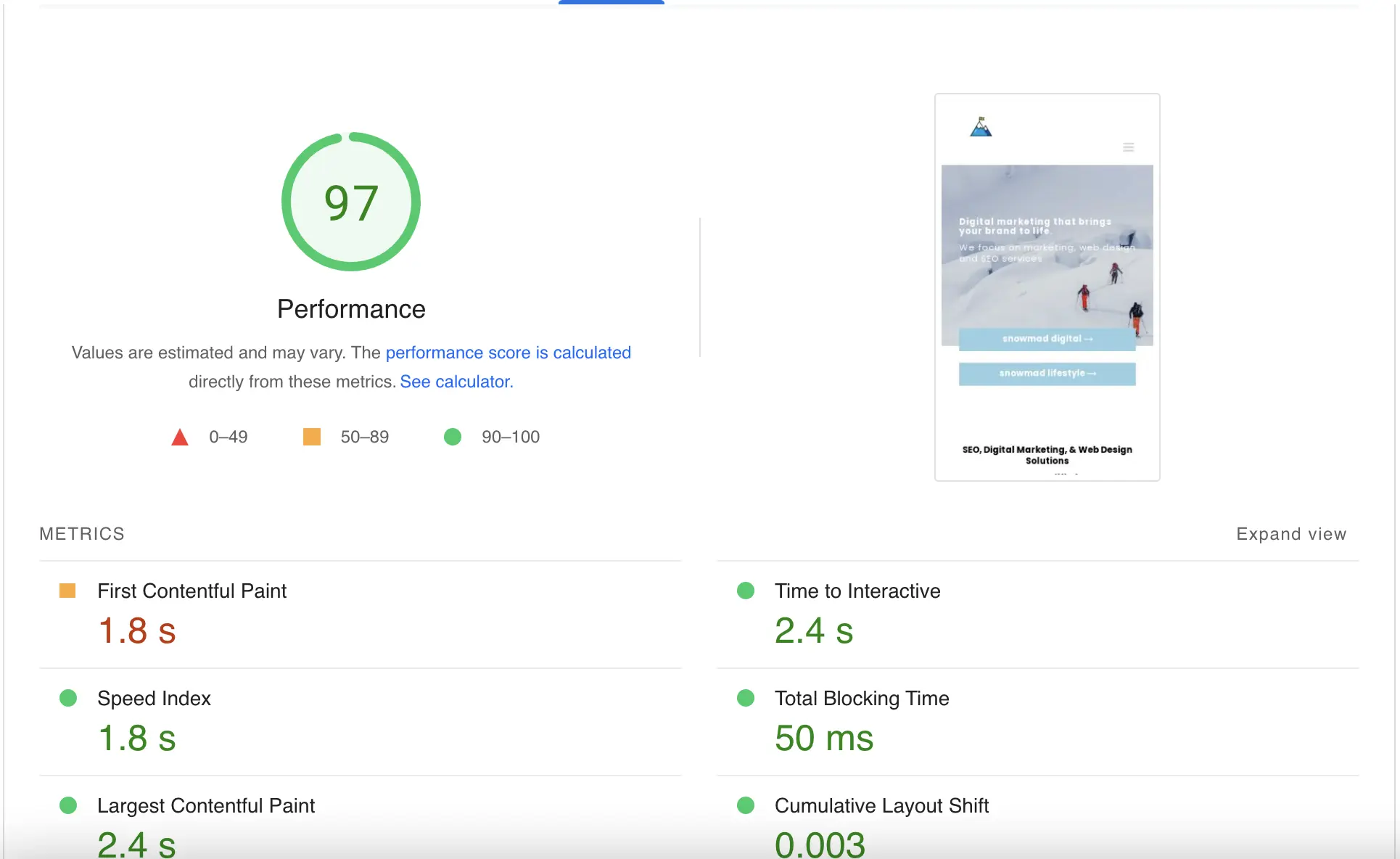Website builders like Squarespace sometimes get hate from SEO enthusiasts.

Look at reviews of different companies using Squarespace, and you will find many complaints about the poor quality of Squarespace SEO.
Some SEO service providers even refused to work with clients on Squarespace (we’ve been guilty of that).
So, is it that bad?
Yes, no, maybe, it depends. That’s my final verdict.
I’m kidding! But you’ll get a variety of opinions across the web. Here’s mine.
First of all, Google and other search engines do not favor any website builder over the other. It mostly boils down to on-page and off-page SEO, including content and backlinks.
In this post, I’ll share the pros and cons of Squarespace SEO so you can decide whether to use Squarespace or not. Read to the bottom for some lesser-known SEO factors that Squarespace lacks.
Squarespace is great for many things, but it’s not perfect and still has some flaws that need to be worked out.
These days, anyone can hop on the internet and build a website with “drag and drop” interfaces like Squarespace and Wix if you have the time and energy.
Suppose you know exactly how to design an exemplary user interface and create a great user experience. In that case, you can drag and drop a website pretty quickly using a builder like Squarespace.
While this is a good and quick option for a small business owner with limited competitors, it has a few downsides to small and medium-sized business owners trying to have the best possible ranking on search engines such as Google.
Bottom line: If you want a website with the best ROI chance, you might be better off with a WordPress website and an SEO specialist. Let’s discuss why.
The Pros of Squarespace
Squarespace is a website platform that’s been around for over 10+ years now.
It started as a service to host websites but has grown and is now one of the most popular website builders.
What’s excellent about Squarespace is that it’s easy to use, has beautiful templates, and the hosting is decent (at best). It’s also got fantastic blogging tools. It ticks off almost all of our SEO boxes.
Squarespace SEO customizations aren’t as good as other platforms like WordPress, though. Squarespace SEO isn’t bad, but it’s not as good.
It has made some tremendous strides in the past few years, making it easy for anyone to look up a few keywords to optimize their site.
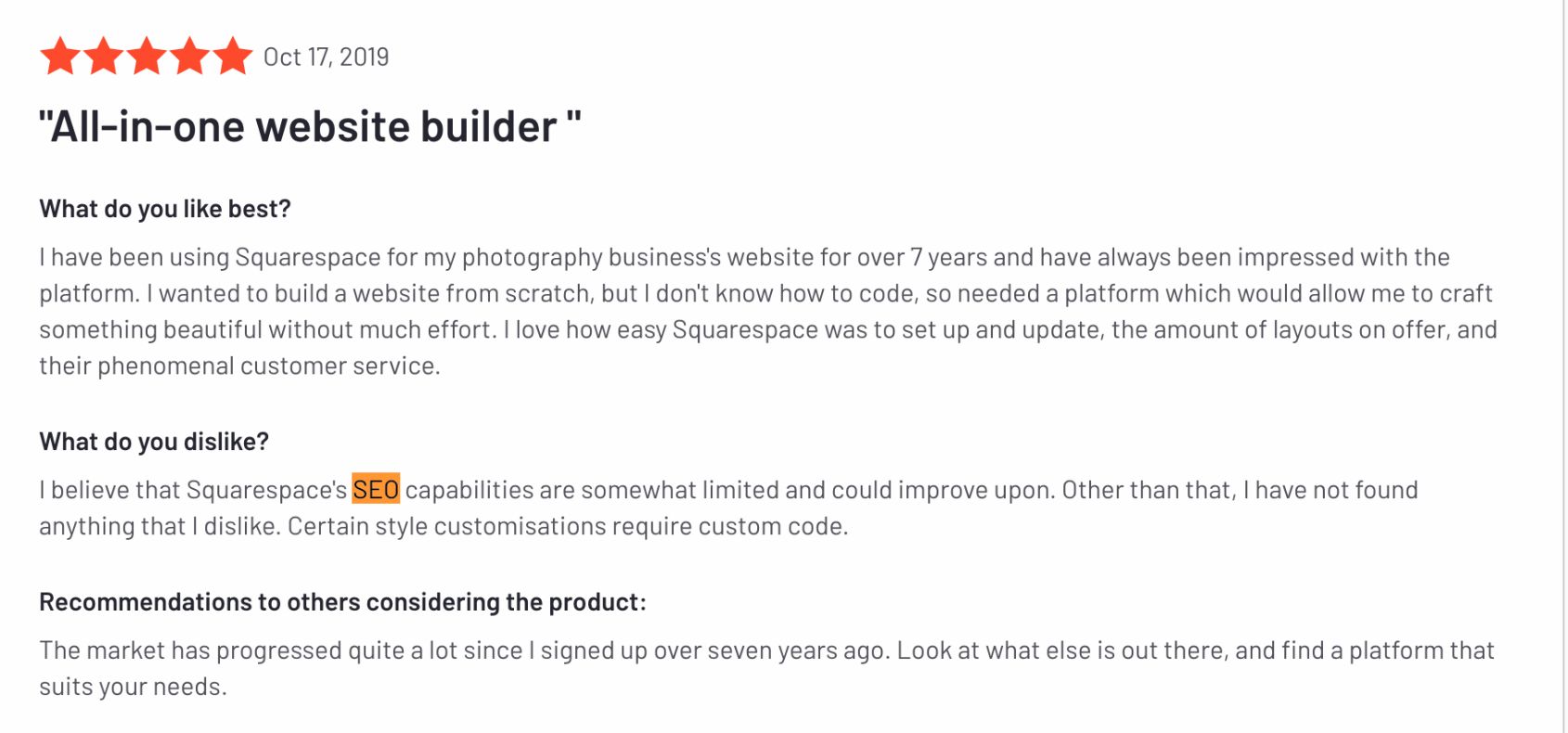
As of 2022, Squarespace has various SEO features to help your site get discovered by search engines like Google.
Some of the key features are:
- H1-H4
- Meta tags
- Clean URL/Permalinks
- Alt text
- Google AMP
- Redirects
- Integrates with Search Console and Analytics
P.S. – Our SEO Squarespace tips include utilizing best practices for the above.
That’s pretty good for starters!
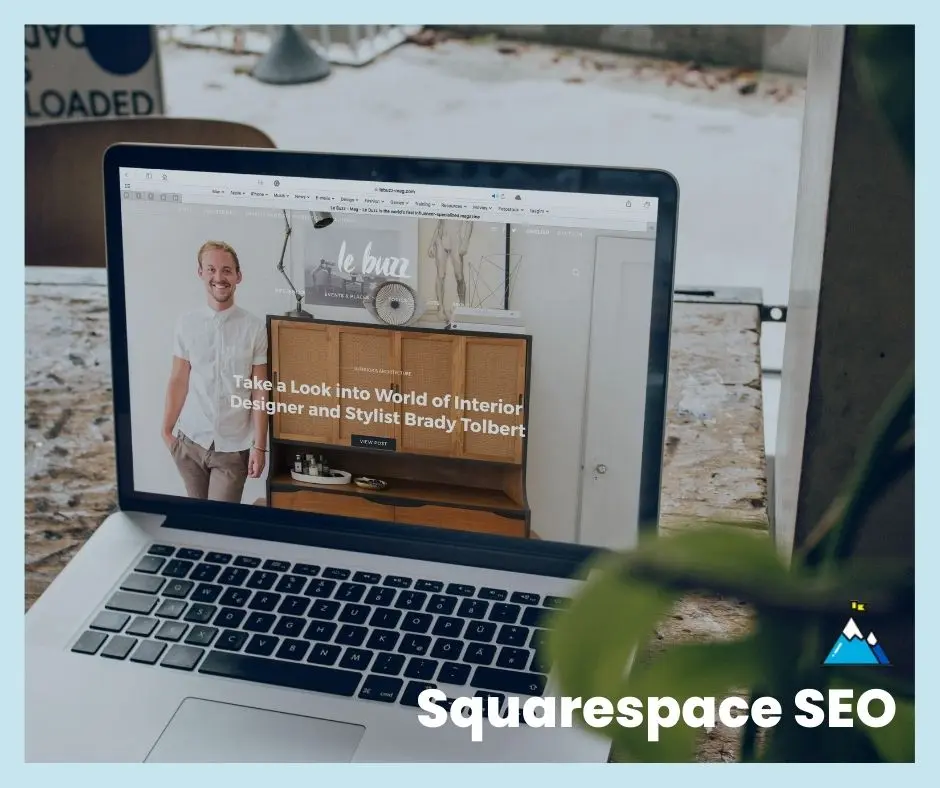
Again, we think it’s great if you are a small business with few competitors on Google.
We’re talking a coffee shop in Victor, ID, or a second-hand gear shop in Jackson, WY. Can you tell where we’ve been lately? ?
You can get away with having a Squarespace site and DIY it if you have a small, not-too-competitive business like this.
Suppose you are in a more competitive market or have a higher cost, such as a wedding venue, luxury brand, hotel, or backcountry gear shop that makes online sales. In that case, you’re better off hiring a web designer and SEO specialist.
Why?
A CMS such as WordPress gives you more power, the ability to customize, and optimization plugins. Especially paired with an SEO expert.
But just cause you have WordPress doesn’t mean you automatically have the upper hand in SEO. You have to pair that with SEO expertise. Take my website for instance.
I’m way too busy serving my client’s SEO needs to work on my own website SEO (whoops). My SEO isn’t great, which is hilarious, sad, and pretty ironic. I have literally all the tools at my fingertips, but making the time to work on my site’s SEO is nonexistent once I factor in my clients and skiing ?.
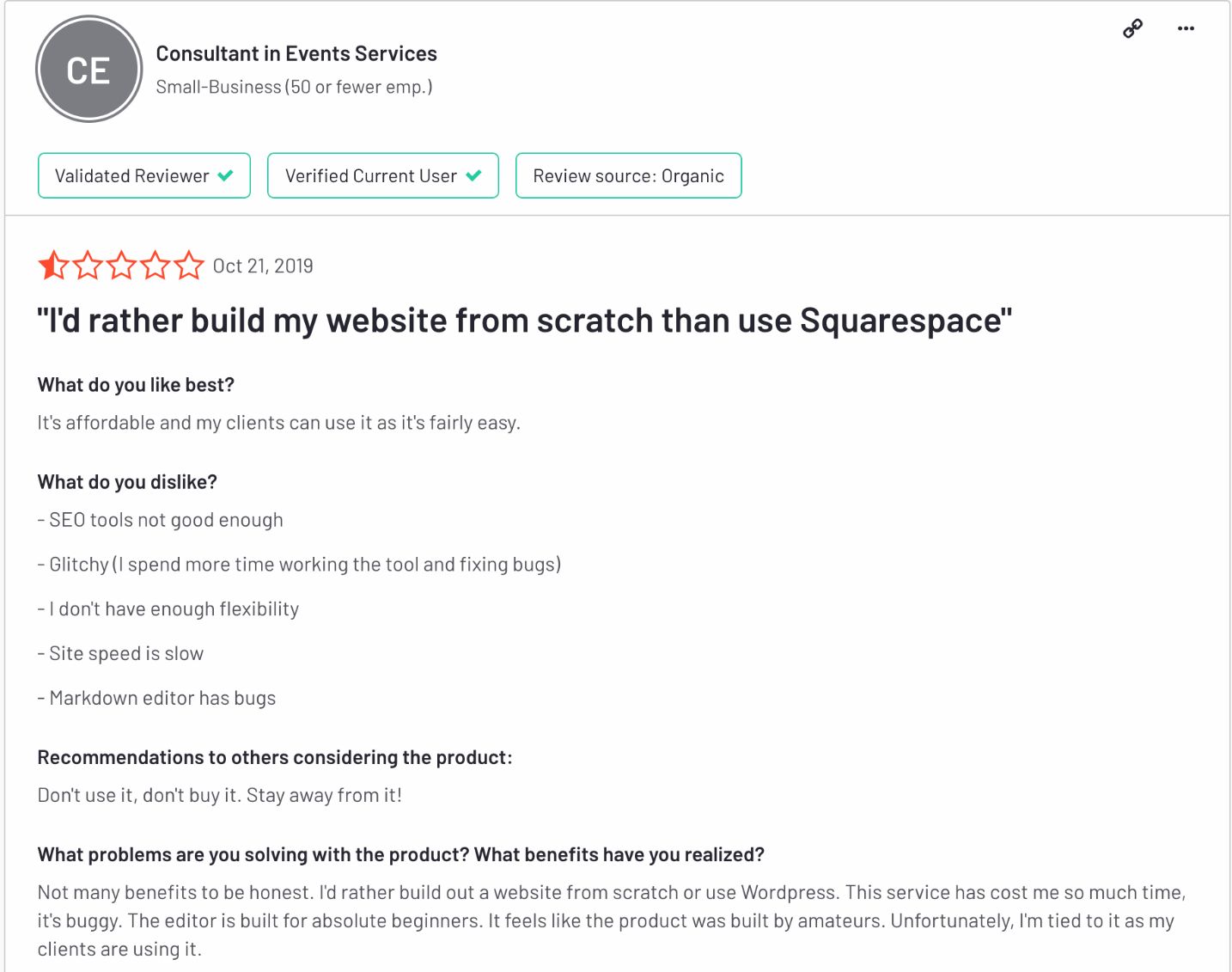
Whatever CMS you choose, do your keywords research, include internal and external links, a beefy title and meta description, and optimized images and pages.
Bottom line: Squarespace is an excellent option for building a simple website, not having too many local or national competitors, and not relying on Google that much for business.
Wedding vendors, for example, typically rely on being referred by wedding venues, so their rankings aren’t usually as important to them.
On the other hand, wedding venues in a highly competitive market are one of the first searches from wedding couples once they’re engaged, which is why business-savvy wedding venue owners care about their SEO.
The Cons of Squarespace
It doesn’t easily cover some technical SEO aspects. You have control over a few of these factors in Squarespace, but some important technical SEO factors are:
- Website Crawling
- log file analysis, XML and/or HTML sitemaps, mobile bot crawl behavior
- Mobile
- AMP, Progressive Web Apps, Responsive design
- SSL
- HTTPS, HTTP/2
- Structured data
- Schema markup, Microdata & JSON-LD, Rich Snippets
- Migrations
- Domain migrations, relaunches, CMS changes, HTTP to HTTPS
- Page speed
- Rich media and script compression, CSS sprites, CDNs, server speed optimization, parallel downloads and minify, caching
- Rendering
- Critical rendering path/lazy loading, DOM rendering, Javascript frameworks rendering
- Content optimization
- Entity optimization, duplicate content, thin content
- Status codes
- 3xx, 4xx, 5xx, orphaned pages
- Indexation
- Canonicalization, robots.txt, meta-tags
- Site structure
- Internal linking, URL structure, taxonomy
If that sounds like a bunch of gobbledegook to you, no worries. Basic SEO is easy and a no-brainer for most who have access to Google to learn (and the time). Once it starts getting more technical, people start to get a little lost. Here are some easier-to-understand concepts below.
Page Speed
Ah yes, the elephant in the room and the hotly-debated topic: page speed. Let’s dive right in.
Google PageSpeed Insights (Lighthouse) are almost always going to give a bad score for Squarespace sites, and it’s primarily due to the massive number of scripts loaded every time a page loads.
This can worsen if you are loading content from a third-party source (FB Pixel, Google Analytics, Hotjar).
Most of this is out of your control on Squarespace, but the image and file sizes are the most significant factors you can control.
Some people will tell you that you can test your site on GTMetrix or Pingdom for speed, which is true.
But ignoring PageSpeed insights and Core Vitals is turning a blind eye to one of SEO’s most important ranking factors.
I know I’ll get a lot of hate for saying that, but I have to keep it real for the business owners reading this.
That being said, you could DIY your WordPress website or hire a bad WordPress web designer and still get a bad score and have a slow-loading website.
It’d be easier to increase your page speed if you hired the right person or learned how to defer/delay javascript and minimize scripts as we do at Snowmad.
Bottom Line: Speed is a ranking factor in SEO and shouldn’t be ignored.
Content reigns king over site speed, but when you need every competitive edge to outpace your competitors on Google, you need to make sure you’re on top of everything.
Schema Markup/Structured Data
The Squarespace e-commerce site automatically generates structured data that helps Google understand your page content. But there are a few things wrong with the process.
For example, when using “text” in your local business schema and not an image logo, your image field will be left blank. Whoops!
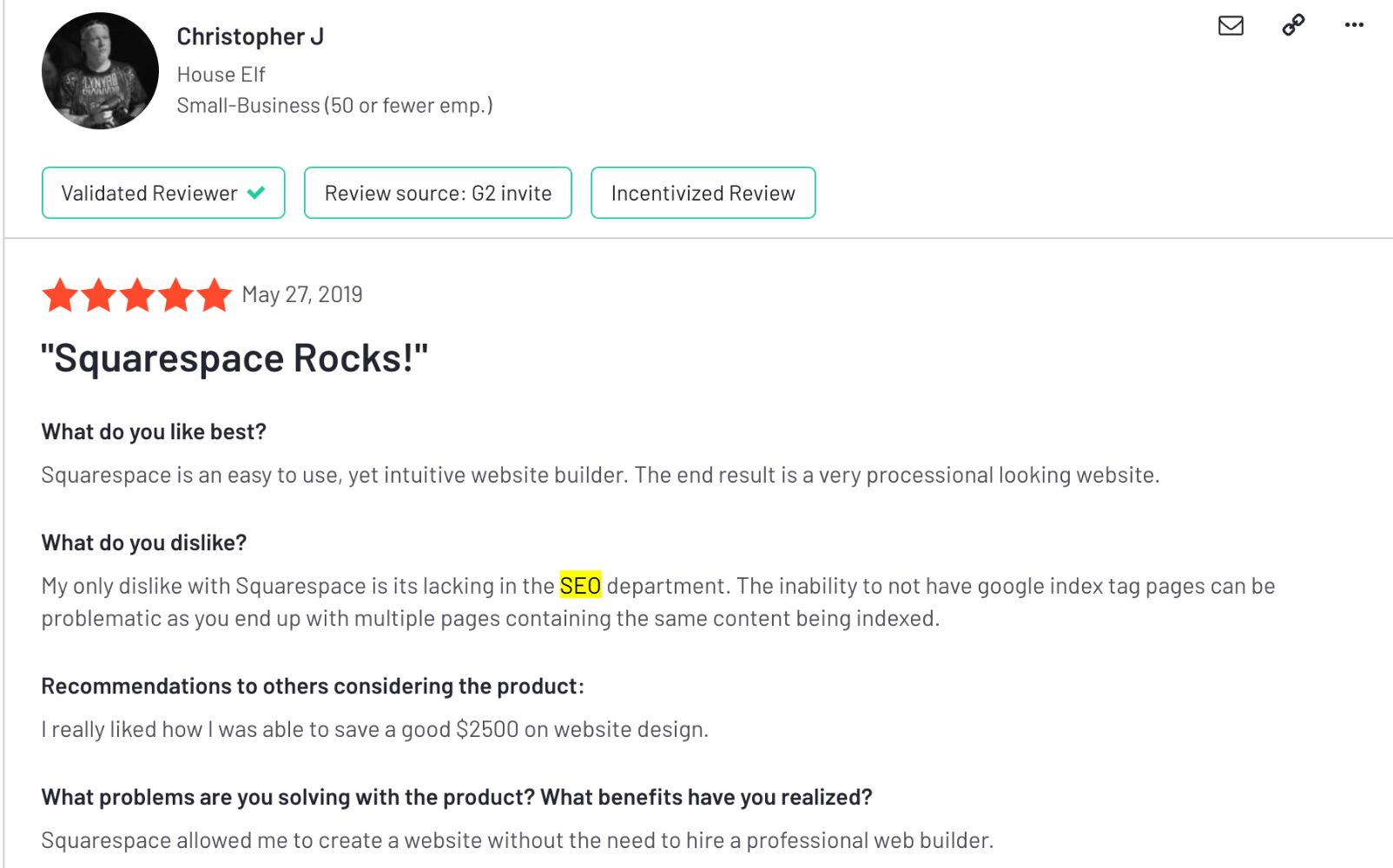
Canonical Tags
Canonical tags allow you to choose the version of a page (or the site’s main index) that search engines should focus on. This prevents them from competing or cannibalizing traffic from one another.
This issue occurs when your Squarespace site’s page has a rel=canonical link in place, but Google disagrees with it and chooses another URL. To fix this, inspect the URL to make sure Google your desired canonical URL.
Squarespace puts canonical tags on your pages automatically. But if you want to edit or change them, you’re out of luck. No bueno!
Template Behavior
Some Squarespace themes do something unusual about SEO – they display that SEO info right on the site. If this happens to you, there are workarounds, but it’s a very odd quirk to manage.
Squarespace layouts are responsive, which is great 90% of the time.
Sometimes, losing control of what content is placed on your mobile site can provide a less-than-desirable experience for the users and affect the experience, which will unsurprisingly lead to ranking issues.
For example, I often modify my mobile design to ensure it has a better experience, and it’s only slightly different from the desktop design but still impactful.
404 and Redirects
Most website builders will automatically create a redirect for you or warn you when changing your URL to avoid site visitors landing on the dreadful 404 page. Squarespace does not automate this. They also don’t show a warning. Oops!
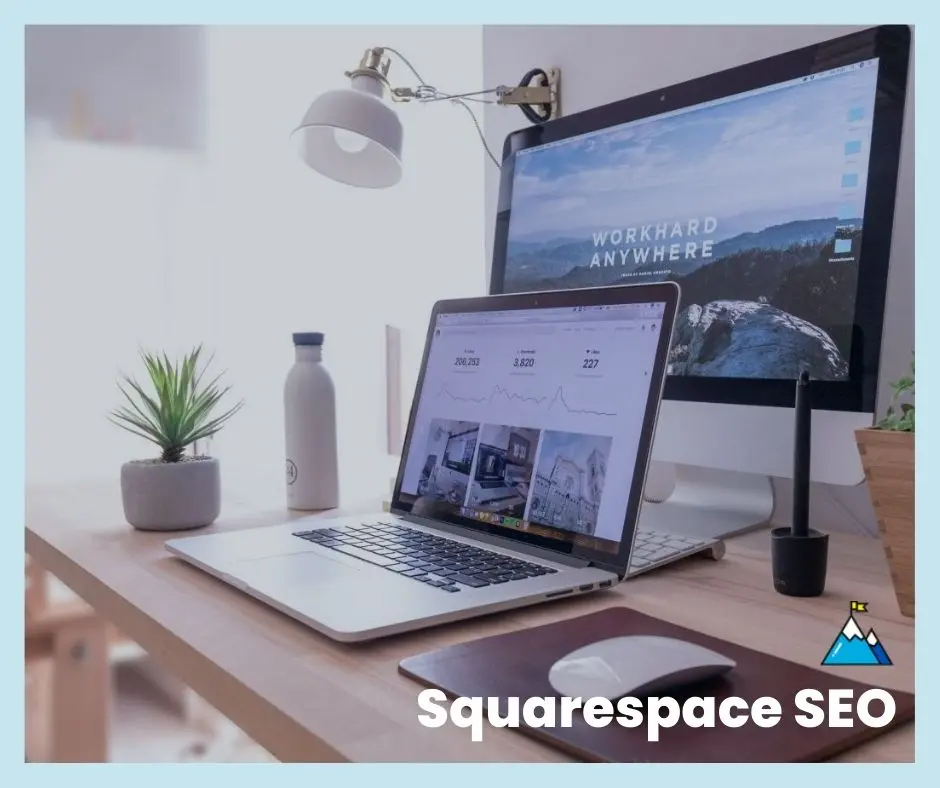
WordPress is a popular content management system (CMS) that many businesses use to create and manage their website.
There’s always some new flashy technology or site designer, but WordPress has stood the test of time. It’s an open-source CMS, unlike Squarespace. This means you can pick your hosting and CDN, for example.
WordPress also integrates well with other marketing tools, making it effective to reach your target audience and promote your business.
However, Squarespace is more beginner-friendly for SEO. While WordPress has more powerful SEO tools, Squarespace can help you start SEO relatively quickly and without any prior experience or knowledge.
We always recommend Squarespace for small-business owners who want to DIY everything in-house.
But if you don’t want to keep up with Google algorithms, stay on top of best SEO practices, spend 10 hours a week writing content and fine-tuning on-page and off-page SEO, and want the highest potential ROI, do yourself a favor hire a great web designer and SEO specialist.
SEO is a highly complex field, so you can’t expect 100 similar opinions if you ask 100 SEO experts how they feel about it.
You can continue reading to see the top FAQs regarding Squarespace SEO.
There’s a whole lot more we could cover on this topic, but hopefully, you get the picture. Good luck with your SEO efforts!




